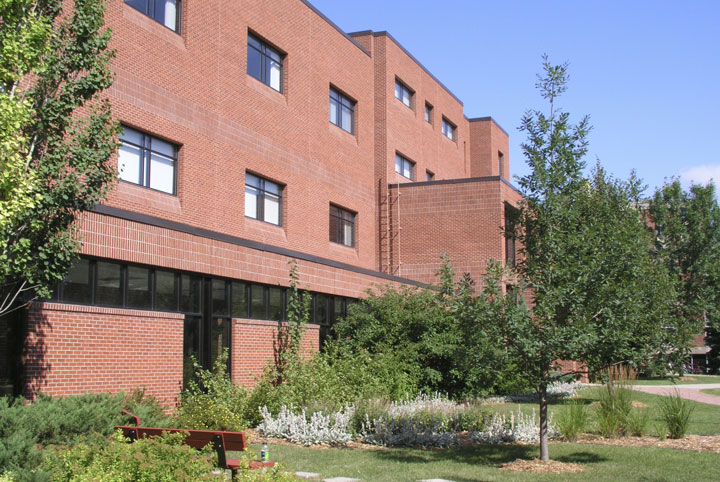
Horticulture
This is an archived copy of the 2018-19 catalog. To access the most recent version of the catalog, please visit https://catalog.ndsu.edu.
Horticulture is the science and art of producing, improving, marketing, and using fruits, vegetables, flowers, turf and ornamental plants. Horticulture encompasses the design and planting for landscapes, parks, highways, and public facilities, including interiorscapes, in rural, suburban, and urban areas. It includes skills for management of greenhouse, nursery, garden center, seed, fruit, vegetable, biotechnology, urban forests, golf courses, sports facilities, and specialty crop enterprises, as well as floral design and flower shops. Instruction and study includes culture, propagation, processing, production, marketing, design and management.
The Horticulture major is a four-year curriculum leading to the B.S. degree. Students also may minor in Horticulture. Prospective students should consult with horticulture faculty regarding programs and options so their educational needs may best be fulfilled. Master of Science and Ph.D. degree programs also are available. For more complete details, see the Graduate Bulletin.
Curriculum Options
Horticulture majors may select one or more options of study. All of the requirements for the major and the supporting disciplines must be met to complete any horticulture option. Students may select from the following six options:
- Horticulture Science: This option is for students who plan to continue formal graduate school education leading to careers in research, teaching, and extension.
- Landscape Design: This option is for students interested in planning, designing, and installing landscape plantings for functional and aesthetic purposes (a 19-credit minor in landscape architecture is required).
- Landscape Management: This option is for students interested in management of designed outdoor environments including public parks, private gardens, botanic gardens as well as commercial and residential landscapes.
- Production-Business: This option is for students who wish to grow, market, and process horticultural crops, for example, nursery, greenhouse and field production of fruit, vegetable or ornamental crops.
- Sports and Urban Turfgrass Management: This option is for students who desire a career in the management of quality turf in such areas as golf courses, sports facilities, parks, as well as commercial and residential lawns.
- Urban Forestry and Parks: This option is for students who desire a career in the management of urban forests and park-like areas, including arboreta, botanic gardens as well as commercial and residential properties.
Special Opportunities
Pre-Forestry: A student who desires to major in forestry may select a two-year pre-forestry curriculum. However, the forestry student must transfer to another institution that offers a Forestry program to complete degree requirements.
Horticulture and Forestry Club: The goal of this club is to provide opportunities to enjoy horticulture and forestry at NDSU outside of the classroom. The club organizes field trips to botanical gardens, arboreta, trade shows, parks and other horticultural sites. Other activities include attending regional and national conferences and competitions. Club members have the opportunity to be involved with growing and marketing horticultural plants for their plant sale fundraisers.
Turf Club: The goals of the Turf Club are to provide students with opportunities to share information, connect with the turf industry, gain real world experience, and broaden their knowledge. The club organizes field trips, topic discussions, and presentations by guest speakers. Other activities include attending regional and national turf conferences, community service, and fundraising.
Plan of Study
Please note this is a sample plan of study and not an official curriculum. Actual student schedules for each semester will vary depending on start year, education goals, applicable transfer credit, and course availability. Students are encouraged to work with their academic advisor on a regular basis to review degree progress and customize an individual plan of study.
| First Year | |||||
|---|---|---|---|---|---|
| Fall | Credits | Spring | Credits | ||
| PLSC 189 | 1 | ENGL 120 | 3 | ||
| ENGL 110 | 4 | BIOL 151 | 3 | ||
| MATH 103 | 3 | SOIL 210 | 3 | ||
| BIOL 150 | 3 | CSCI 114 | 3 | ||
| Humanities/Fine Arts | 3 | Humanities/Fine Arts | 3 | ||
| 14 | 15 | ||||
| Second Year | |||||
| Fall | Credits | Spring | Credits | ||
| CHEM 121 & 121L | 4 | CHEM 122 | 3 | ||
| PLSC 210 | 3 | ECON 105, 201, or 202 | 3 | ||
| PLSC 211 | 1 | Social/Behavioral Science | 3 | ||
| PLSC 355 | 3 | Electives | 6 | ||
| Elective | 5 | ||||
| 16 | 15 | ||||
| Third Year | |||||
| Fall | Credits | Spring | Credits | Summer | Credits |
| PLSC 365 | 2 | PPTH 455 or 457 | 3 | PLSC 496 or PLSC 494 | 3 |
| PPTH 324 | 3 | PLSC 323 | 3 | ||
| ENGL 320, 321, or 324 | 3 | PLSC 380 | 3 | ||
| STAT 330 | 3 | Electives | 6 | ||
| Electives | 4 | ||||
| 15 | 15 | 3 | |||
| Fourth Year | |||||
| Fall | Credits | Spring | Credits | ||
| ENT 350 | 3 | PLSC 457 | 3 | ||
| Electives | 12 | PLSC 491 | 4 | ||
| Electives | 8 | ||||
| 15 | 15 | ||||
| Total Credits: 123 | |||||
